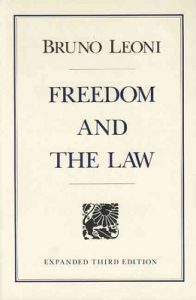Our Virtual Reading Group on Bruno Leoni’s Freedom and the Law has been magnificent. The book is still capable of eliciting disagreement and suggesting new ideas. Several participants never read it before and were impressed, not least because of its style: Leoni’s lectures were reviewed and edited by Arthur Kemp, who perhaps also deserves some credit for streamlining his friend’s English.

The last session is devoted to Leoni and libertarianism. To what extent did Leoni fit into this tradition? The readings are a review written by Murray N. Rothbard and published by the New Individualist Review and a more recent contribution by Todd Zywicki. The New Individualist Review was a short-lived but great publication, edited by a few brilliant scholars then PhD students at the University of Chicago, destined to become brilliant scholars. The book review editor was Ronald Hamowy (who published a brilliant, critical review of Hayek’s The Constitution of Liberty) and the editor-in-chief Ralph Raico, a brilliant historian much missed by his friends.
In a sense, the two pieces were published so distant in time (Rothbard’s in 1962, Zywicki’s in 2014) that one may be tempted to see the different sensibilities between them as reflecting the time which has passed and the evolution in the libertarian movement. Or perhaps the difference results from the fact that Zywicki is a legal scholar, whereas Rothbard was mainly an economist.
Rothbard is critical of Leoni in the following sense: he is dissatisfied with Leoni lacking a clear-cut idea of what makes the law legitimate (or illegitimate), which needs to be a strongly anchored criterion (like, Rothbard will later argue, anchored in natural law) in order to avoid leeway towards an interventionist position.
Rothbard quotes Hamowy’s review of F. A. Hayek’s The Constitution of Liberty and sobs:
the tragic puzzle is that so many quasi-libertarian thinkers have, over the years, failed to adopt this definition of constraint or have failed to limit violence to counteracting violence, and have instead opened the door to statism by using such vague, jumbled concepts as “harm,” “interference,” “feelings of constraint,” etc. Decree that no violence may be initiated against another man, and all the loopholes for tyranny which even such men as Leoni concede—blue laws, government lighthouses, taxation, etc.,—would be swept away
I think, on that matter, Rothbard is a bit off the mark. Leoni was extremely wary of inadvertently opening the door to interventionism, and his very book testifies to that.
Leoni was not an anarchist libertarian (or “anarcho-capitalist”) but one also needs to consider that he died in 1967. He admired the Austrian school, Mises and Hayek, but also Rothbard. His copy of Man, Economy and the State was well-worn and full of marginalia.
We don’t know where more mature reflection by Leoni would have led him. We have some hint though by reading “The Law as Individual Claim”: an essay that (together with similar works on political exchange) suggests that Leoni was working on a broader, more general theory of law and politics.
To quote from Zywicki’s paper:
For Leoni, the idea of “law as individual claim” means that the law essentially leaves individuals alone, unless two private citizens seek intervention by a judge to resolve a dispute between them. … the whole point of common-law rules is that they are there for private parties to use to coordinate their affairs, but where the rules are not useful to that end, the parties are at liberty to ignore them and create their own rules by contracting around them. This explanation is the essence of his idea that the common law is a “spontaneous order” analogous to the market process: there is sort of back-and-forth collaboration between individuals asserting individual claims and judges resolving those claims and improving the law to better meet specific demands. In turn, those resolutions feed back into individuals’ decision-making and either promote or undermine private expectations and private ordering. Moreover, judges can be seen as entrepreneurs, proposing different rules in order to see which rules fit individual expectations
most efficaciously. From this enterprise of private, uncoordinated litigants seeking to vindicate their individual claims, an entire legal system springs up.
This has strong implications for libertarianism, perhaps it is a way of framing a libertarian order all together. I am eager to listen to our participants’ views.


Comments are closed.